Now, with the help of the Hashem, let us delve into the Kavanot surrounding the Mikvah, to elucidate the exalted status it holds
In this older article, we discussed some of the simple meaning and benefits of the Mikvah. Here we will delve into 4 more Kavanot and Yichudim that will aid men in drawing themselves closer to Hashem.
The matter of the Mikvah is the foundation of purity, a gateway to Hashem through which the righteous enter. We will explore the concept of the Mikvah according to the holy teachings of the Kabbalists, the Arizal and the Rashash (may their merits protect us). Alongside, we will also integrate the plain meanings and reasons from the teachings of our holy Torah and Chassidic masters (may their memories be a blessing), so that everything is set before us like a well-prepared table, making it accessible and pleasant for the student, and may it find favor before Hashem
“And may the pleasantness of Hashem, our G-d, be upon us…” (Psalms 90:17).

The Concepts of Purity (Tahara) and Impurity (Tumah):
As part of our faith in Hashem and His Torah, it is established in our holy Torah the concept of impurity (tumah) in all its forms and details, which every Jewish person is commanded to distance themselves from, as well as anything similar to it. Additionally, the Torah outlines the various methods of purification (taharah), detailing how a person can cleanse themselves from impurity through immersion in the Mikvah, waiting until nightfall, and other means, as mentioned in various places throughout the Torah and Talmud.
Just as we do not fully comprehend many aspects of our holy Torah, neither do we fully understand the reasons and nature of impurity and purity. I believe however that Taharah helps a person think properly and more clearly, besides making him feel cohesive as a whole.
Regardless, we can’t grasp why certain actions render a person impure, and why immersion in water and other rituals purify them—this is a secret known only to Hashem. Nevertheless, we have faith that everything the Blessed One decreed and established in the holy Torah is His will and for His glory, and we accept and fulfill His holy will with love and joy, as our master, the Rambam, wrote at the end of the laws of Mikvaot in these words:
“It is clear and known that the laws of impurity and purity are decrees of the Torah, and they are not matters that human logic can decide upon; they are included among the statutes (chukim). Similarly, the immersion from impurity is included among the statutes, for impurity is not mud or filth that water can remove, but rather a decree of the Torah, and the matter depends on the intention of the heart.”
The Sefer HaChinuch
The Sefer HaChinuch also writes about this matter (Mitzvah 159), and these are his words: “Now, after this introduction, that the wisdom of G-d surpasses all wisdom, and that He only commands for our benefit and for a great purpose, we have no difficulty or question concerning any prohibition of foods or the distancing from impurity, even if the benefit is not known to us or accessible through investigation, for we know truly that all is for the good.
And do not be surprised, my son, if the matter of impurity is hidden from all understanding, for it is possible that impurity harms the soul and weakens it somewhat. And so I have heard this from the wise, similar to what our Sages of blessed memory said (Yoma 39a), ‘and you will be defiled by them’—it is written without the letter ‘alef’, which can be read as ‘and you will become stupid by them,’ meaning that the wells of wisdom, which is the enduring soul, become somewhat corrupted through impurity.
And do not be surprised that the intellect is damaged by physical matters, even though it is not of the same type, for due to the connection of the soul with the body, this inevitably happens. Therefore, we, as human beings with our limited understanding, do not fully know the soul and its nature, and how can we hope to know its cure or its sickness through investigation? Indeed, physicians have no means of healing until they recognize the root of the illness.
Therefore, regarding all the statutes and decrees that have come as a result of impurity, we should not challenge or question them, for we have not reached the ultimate understanding of the matters of the soul, to know its essence, origin, and purpose. For this reason, there remains a veil over our understanding of all the laws of impurity and purification, to the extent that the innovation of the red heifer, which defiles the pure and purifies the impure, almost blinds us. We will also expand on this matter (in Mitzvah 397) with G-d’s help, to receive reward for the effort of finding words of desire.”

Impurity of Seminal Emission and Its Significance
One of the impurities still relevant today is the impurity of seminal emission (Keri), as mentioned in our holy Torah: “If any man has an emission of semen, he shall wash his entire body in water and be unclean until evening” (Leviticus 15:16). Our sages taught that a man from whom semen is emitted, in any manner, is called a “Baal Keri,” based on the verse: “If there is among you any man who is not clean by reason of a nocturnal emission” (Devarim 23:11).
Although the verse specifically mentions a nocturnal emission, since it states “who is not clean,” it applies to daytime emissions as well, not just those at night (see Responsa Tashbatz, Part 1, Siman 101-102). A person does not become purified from this impurity until he immerses in water.
The reason why seminal emission renders a person impure is beautifully explained in Sefer HaChinuch (Mitzvah 180), where it states: The essence of the commandment regarding the impurity of seminal emission is that it brings impurity and defilement, as it is written: “And any man from whom semen comes forth shall wash all his flesh in water and be unclean until evening.”
The root of this commandment is that this matter generally arises from physical desires, and the perfect Torah informs us that the body becomes defiled through these desires because the primary purpose of a person’s existence in this world is to engage in intellectual pursuits and to serve his Creator. Therefore, when this act occurs, showing a tendency toward material desire, it is fitting for him to remain in his impurity for a while to purify himself thoroughly afterward. This impurity of seminal emission applies everywhere and at all times.
The Arizal, of blessed memory, teaches that the root of impurity is the 400 forces of impurity, corresponding to the 400 men of Esau. As it is mentioned in the sacred book “Mechaberet HaKodesh” (Shaar HaShabbat), related to one of the Kavanot below, each point represents 10, making a total of 400, alluding to what is written: ‘And with him were 400 men,’ who represent the forces of impurity. When a person immerses, he purges these impurities from himself.
The idea is that in the realm of Binah (understanding), there is no grasp for the external forces, but below it, they are able to attach themselves to it (which is why Yaakov was particularly afraid of the number 400 when the angel mentioned it to him, before his meeting). Therefore, a person, who is likened to Zeir Anpin, is not cleansed from these impurities until he enters the Mikvah, which symbolizes Binah, where the external forces have no hold.”

The Impurity of Seminal Emission is a Severe Impurity and is Evident on a Person All Day, Even After Immersion
The Arizal further instructs us that the impurity of seminal emission is a severe impurity and remains evident on a person’s forehead throughout the entire day, even after they have immersed for purification. As written in Shaar Ruach HaKodesh (page 4):
“Regarding the impurity of seminal emission, my teacher (the Arizal) of blessed memory told me that the impurity is revealed on a person’s forehead throughout that entire day, even if they have immersed. It is only slightly diminished, but if the person has not immersed, the impurity remains visible on them constantly until they immerse.”
Moreover, even on Shabbat, when the sanctity of the time grants a person an additional soul (Nefesh Yeteirah), as brought in the sacred book Mechaberet HaKodesh. Shabbat generally conceals a person’s sins so that they are not visible on their forehead. However, if the person is impure due to seminal emission, the impurity remains evident on their forehead and is not concealed until they immerse for purification.
A Person Cannot Achieve True Fear of God If He Does Not Immerse for Seminal Emission:
There are many sources in Chassidic and Kabbalistic literature that teach us that a person who does not immerse himself after a seminal emission will not be able to attain the ultimate fear of God. Similarly, he will not be able to influence or teach the Jewish people to reach this exalted level. Moreover, if one studies the secrets of the Torah while in a state of impurity, such study may lead him to heresy and apostasy.
The Gemara (Berakhot 22a) states that the prohibition for one with a seminal emission to study Torah comes from the verse “And you shall teach them to your children and to your children’s children” (Devarim 4:9), and it is written right after, “the day that you stood before the Lord your God at Horev” (Devarim 4:10). Just as at Horev there was awe, fear, trembling, and sweating, so too must one study Torah with awe, fear, trembling, and sweating.
From here, it is learned that one cannot achieve the ultimate fear of God unless he immerses himself as required. Rashi explains this above in the context of the blessing after meals, noting that prayer is different because it involves accepting the sovereignty of God, but one must still immerse before studying Torah or praying to properly receive and understand the teachings. The sages of the Gemara did not cancel this requirement because not everyone could uphold it, but those who are truly committed to achieving the essence of Torah and mitzvot need to observe this immersion meticulously.
The Zohar also teaches that a person’s stance in Olam HaBah (world to come) is directly correlated with his Fear of Hashem . Furthermore, we learn from the juxtaposition of the verses, “And you shall teach them to your children and to your children’s children” and “the day that you stood before the Lord your God at Horeb” that it is also impossible to teach students and instill in them the true fear of God if one does not take care to immerse.
The general principle derived from this is that one who studies the simple meaning of the Torah without being pure cannot truly grasp what fear of God is. And, one who studies Kabbalah without being careful with immersion may come, Heaven forbid, to heresy, as is the case of Shabbetai Tzvi. While dipping in the Mikvah is (arguably) not a Mitzvah per se, it achieves more than any other Mitzvah.
With all that said, all that is left is to give the Kavanot for the Mikvah.
1. Yichud of the 40 points (from the Arizal’s Machberet HaKodesh, based on the Zohar, as found in the Siddur Ha’Yare)
The explanation is in Hebrew:
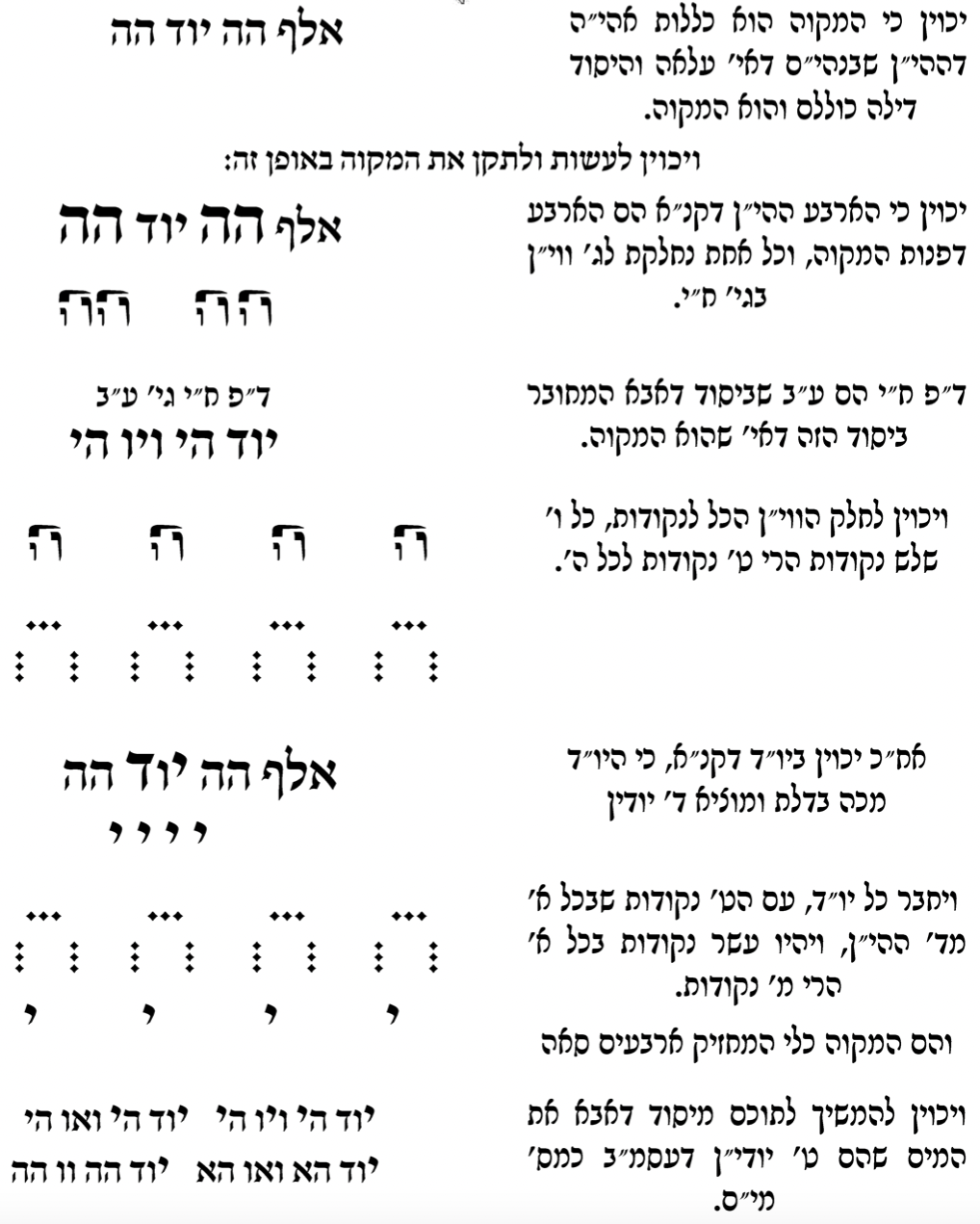
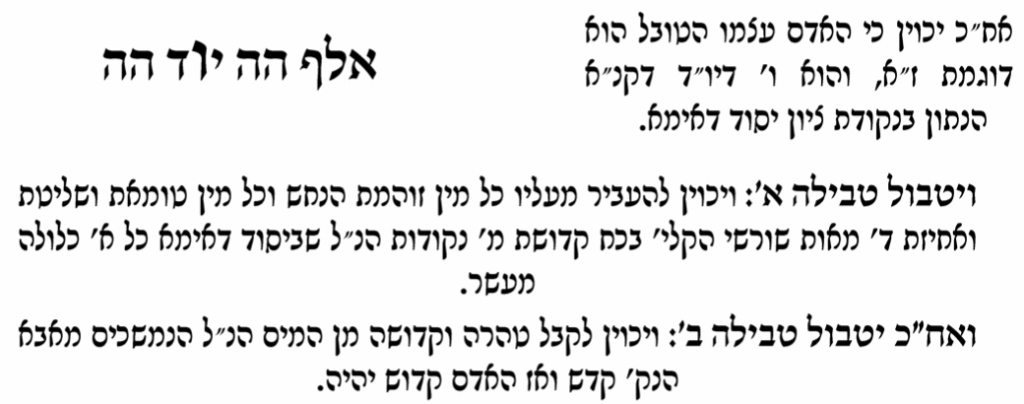
2. Yichud of the upper waters and lower waters
The explanation is in Hebrew:
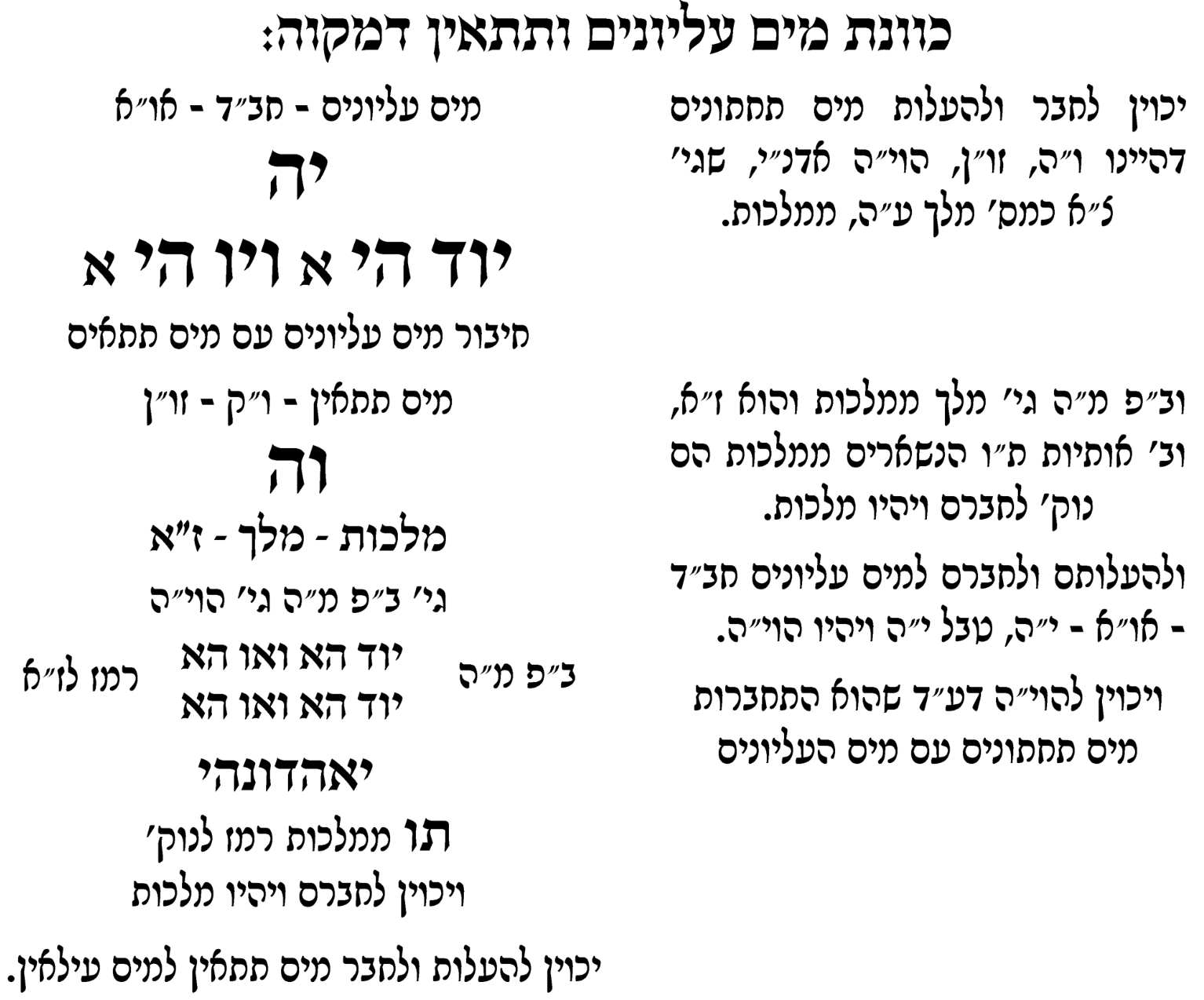
3. Kavanah of the Baal Shem Tov:
The explanation is in Hebrew:


4. Kavanah of the 13 attributes of mercy and union of Partzufim
This is a little more complicated sequence: First, it’s important to cleanse oneself of all the bad thoughts with the following Yichud, which can be done on its own:
Then, one needs to take a dip for every letter of the 3 names אדני יהוה אהיה which are associated with the 4 death penalties, juxtaposed vertically as the figure below.
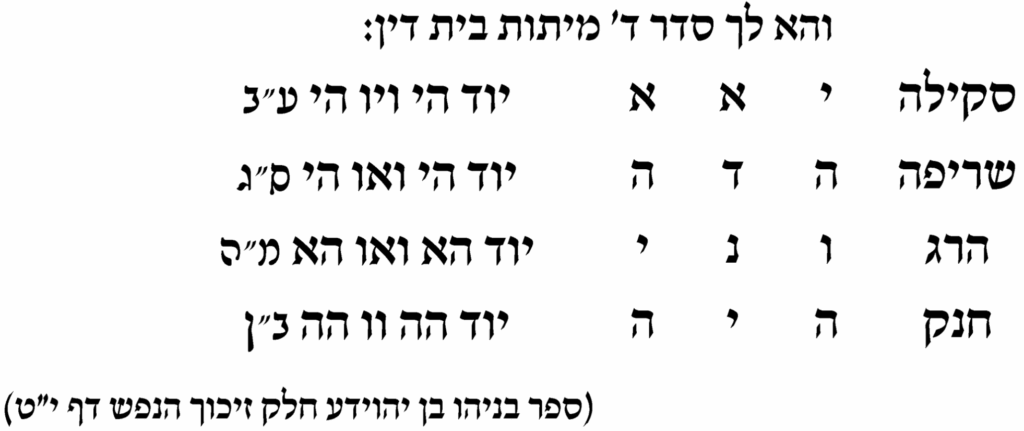
This is how the sequence goes:
- First one needs to be mekaven to elevate the first letter of אדני (Malkhut) up to with the first letter of יהוה (Zeir Anpin) on the first dip.
- On the second dip, be mekaven lower the first letter of יהוה down to illuminate the first letter of אדני.
- Finally, for the third dip, be mekaven to lower the first letter of אהיה (Binah) down to illuminate the other 2 letters we just mentioned.
Now we completed the first set, and do the same for the next three sets, from top to bottom, for 12 dips in the Mikvah. On the 13th dip, we unify all the names together. Then as the man goes out of the Mikvah (and gets covered), be mekaven that he’s drawing down God’s 13 Attributes of Mercy, as below:
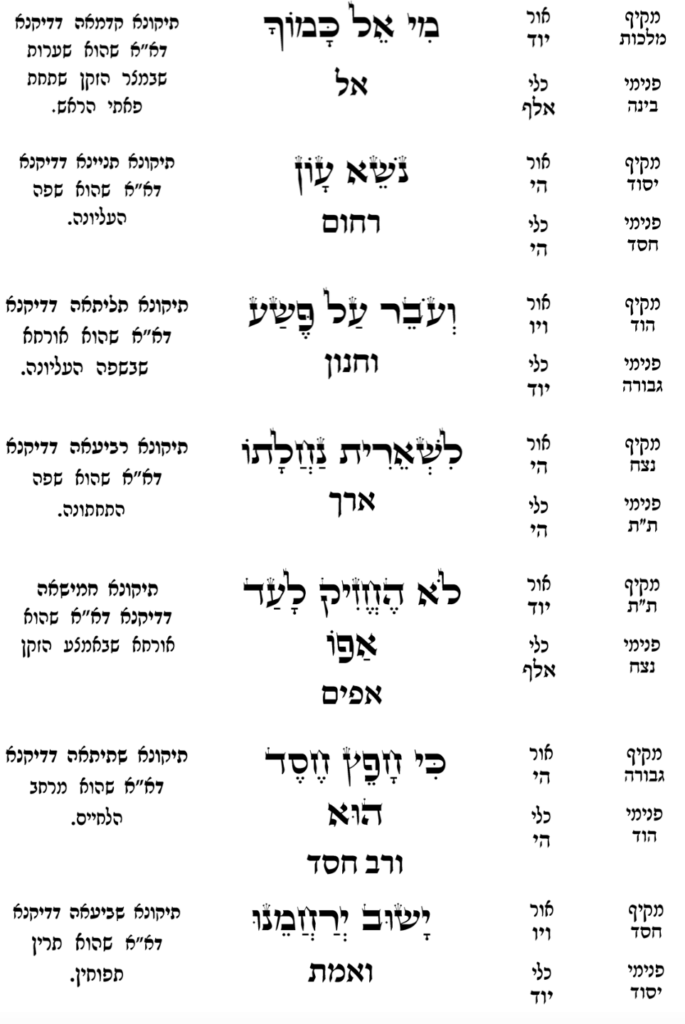
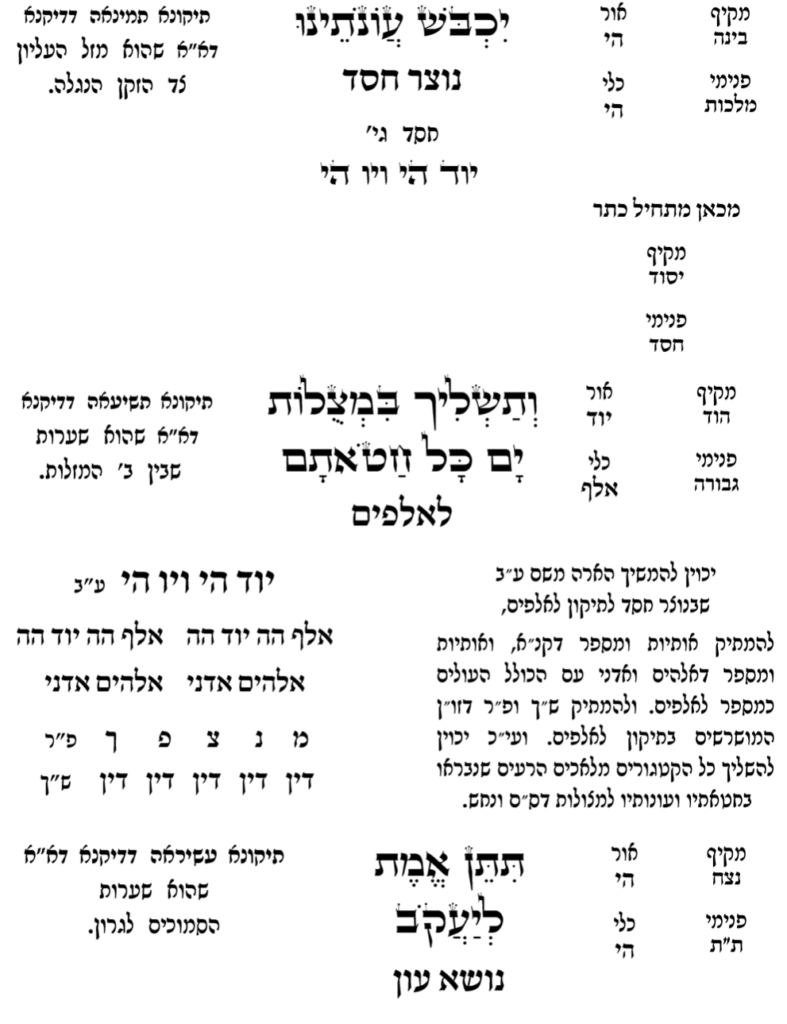
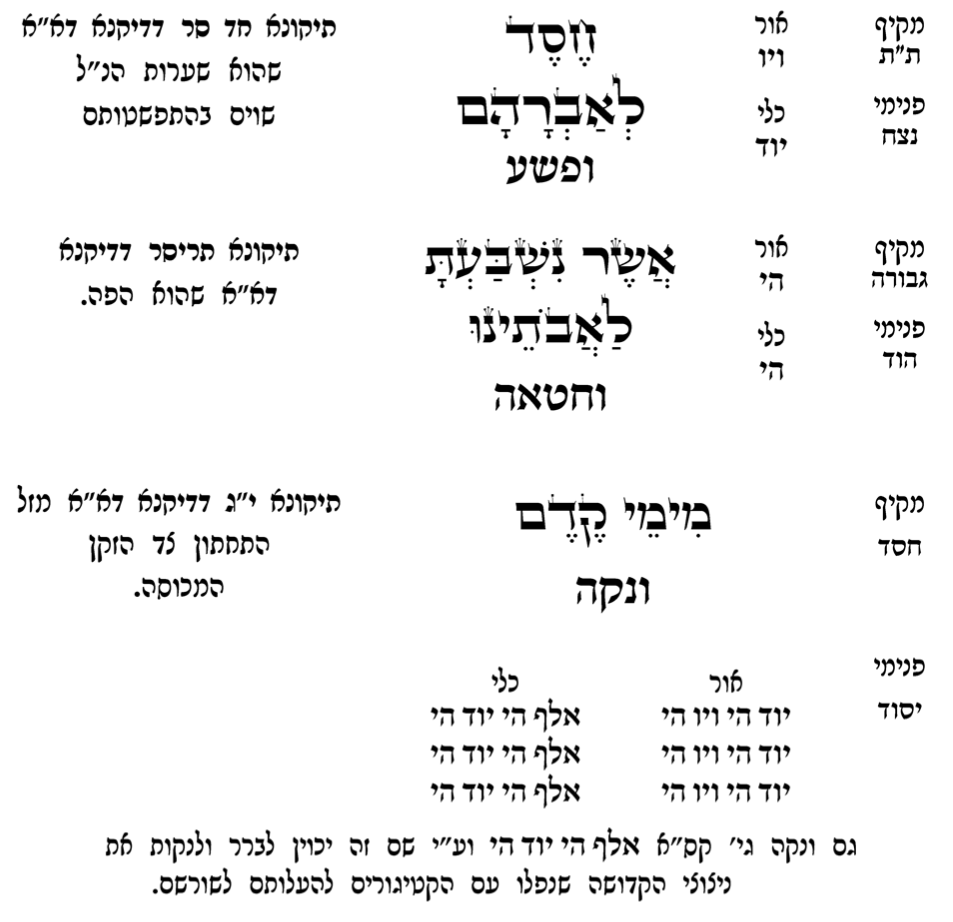
Concluding remarks
These Kavanot are extremely powerful and I highly recommend them for men who want to increase in purity. I realize this is a lot to take in one go, but start small, incorporate in your Mikvah immersions and once you know it by heart, move to the next one. Also, you don’t need to do all of them, see what works best.
The Mikvah represents the aspect of the “foundation of Binah” as is known, and when one immerses, it is like the fetus in the womb (represented as a “cube” or three-dimensional space). Upon emerging from the immersion, he is like a newborn, having been renewed and purified. There’s nothing that can compare to the Mikvah and it brings many awesome blessings to those who are strict with going, or at least try to go every day. It is a minhag with tremendous potential that is simply awaiting men to unlock it.
May we merit to bring down all the purity from the Mikvah with joy and fear of Hashem.







